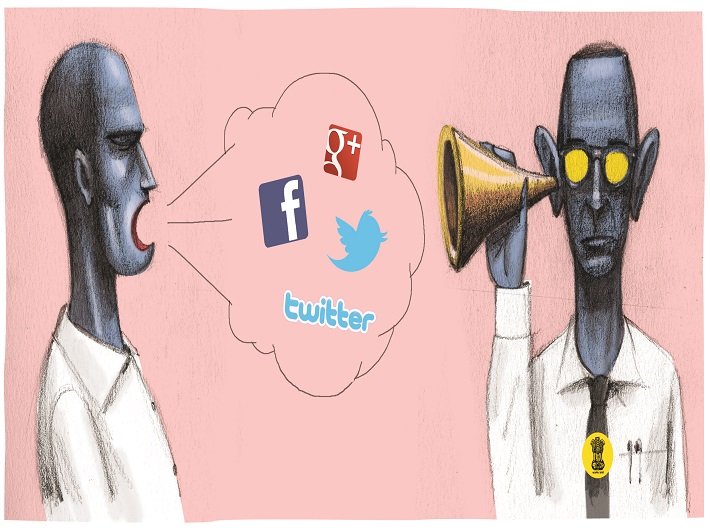People’s voices matter in a democracy and soon this political dictum will move beyond the realm of rhetoric to become a reality. What can be seen as a clear attempt to establish a ‘deliberative democracy’, the department of electronics and information technology (DeitY) has been given the responsibility of gauging the mood of people on various issues. And this is not aimed at ‘big brotherly’ watch, rather it is intended to help policy makers to formulate policies which suits its citizens.
The government will now officially scan social media platforms and top ten news websites to access the public mood on various issues. The team behind the MyGov platform has recently floated an expression of interest (EoI) to develop a data analytic tool that will analyse the various social media platforms and news websites for the topics that are trending on MyGov.
But should the government have the right to ‘listen’ into social media channels? A debate has already begun. Gaurav Dwivedi, CEO, MyGov, DeitY, does not see it as snooping or breach of privacy. He says, “We are not ‘listening’ in on social media. We will track only those issues on social media which are already being discussed on MyGov.”
The idea is to ensure that policy makers do not have to depend on a single source of information and viewpoint generated by MyGov. Rather multiple viewpoints from across the different social media channels are made accessible to them.
One point for all information sharing
Social media has become a platform where the common man can not only voice his concerns, but also share his ideas. MyGov is just one of the examples which has leveraged this facility.
In a sense, social media offers citizens a platform to get involved with the government and the whole governance process. Various ministries and departments have their own interactive websites and Facebook pages. The Delhi traffic police has used the content from their Facebook page to identify the busy and the less prominent junctions in the city. With the knowledge provided by the citizens, the department has been able to put up the required signboards at these junctions. Another ministry which has used social media and the content on it for policy-making is the information and broadcasting (I&B) ministry.
Discussing their presence on social media, R Jaya, joint secretary, I&B ministry, says, “Social media platforms are a two-way mechanism, where we provide all information pertaining to the government. We also discuss the issues of the day and the important events that are to take place. And in response we get the citizen’s unmediated views.” The ministry has more than three lakh followers on Facebook who contribute to the topics.
The ministry also has a separate social media cell, which has been given the responsibility of disseminating information. Created back in 2012, the cell, the new media wing, considers the feedback it receives on social media, chooses the most suitable information and passes it on.
Using the impact and power of social media to their benefit, Jaya mentions the Talkathon, which took place on the first day of the budget session, where the finance minister interacted with the citizens on the budget. “The event has been conducive because the team has had earlier experience with social media. However capacity has to be built up,” says the joint secretary.
In case of MyGov, the website offers a comprehensive platform for a range of topics that all the ministries are discussing. “The engagement process increases to a new level if the content is broad, if the range of activities is broad,” said Dwivedi, adding that people choose to interact more if there are a lot of things to do at the same place.
One of the main reasons why social media has become such a favourite for policy makers is because of its strong aspect of engaging the other side. Explains Dwivedi drawing specifics to the MyGov platform: “A successful engagement process has to be sustainable and continued process. It is not limited to one time or one process.”
The idea generation
The latest union and railway budgets incorporated ideas that were given on the social media platform. In case of the railway budget, ideas such as the bio-toilet, and more of private participation were suggested on MyGov. In the case of the main budget, the ideas of benami transaction prohibition and gold bonds were suggested on the same platform. However, it is also clear that implementing these ideas at a policy level is a time-consuming process. It has to follow a proper process. In fact, the process of collecting the information and handing it over to the appropriate ministry lies with the MyGov team.
An in-house team of the MyGov team scans all the discussion. They look at each topic and try to identify the most useful information and prepare a summary based on that. The team also provides the entire database to the specific ministry. The team prepares a subjective analysis report for each of the ministries.
The analysis report is based on several factors, including how many people support an idea. This is also measured in two ways, either on how many times a single idea has been suggested or even though suggested once, how many likes the idea has received.
Not to be left behind, the ruling Bharatiya Janata Party has put in place processes to review the social media content to assess the impact of their statements and schemes. “We find very interesting ideas that come through social media, we gauge popular sentiment on various issues. Social media helps us better understand issues from a people’s perspective. In effect it helps us keep more in tandem with the times and the wishes of the people,” says Vinit Goenka, national co-convener, BJP.
The increased impact
As governments all over the world realise the power of social media, DeitY is handing over increased responsibility to the MyGov team. Now they will not only be responsible for collecting the data from MyGov platform, but their jurisdiction will increase to other social media platforms like Facebook and the top ten news websites.
Discussing the level of involvement of the team once the new analytical tool is in place, Dwivedi adds, “A certain level of manual intervention is always required.” For example, the CEO says at times it becomes difficult for the software to differentiate various sentiments attached to the same word.
On the basis of the scale at which this project will be implemented, Dwivedi says that it will be a trendsetter. “There are other countries like Singapore that have used social media in policy making, but not at this scale. This project will involve crores of people.”
With the supreme court striking off the draconian Section 66A of the Information Technology Act, the quantum of “free, dissenting voices” is certainly going to increase, making it all the more important for the government and development agencies track and listen to the social media posts. This will give them a lot of insight into what is wrong and what works better – paving way for more informed policy and decision making. Whether the initiative leads to invasion of privacy or not, is a question that will be answered only in time to come.
ankita@governancenow.com
(The article appears in the April 16-30, 2015, issue)

